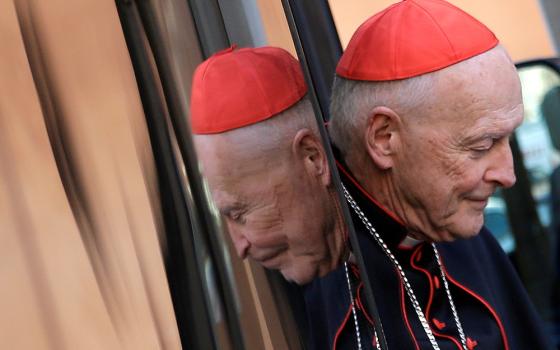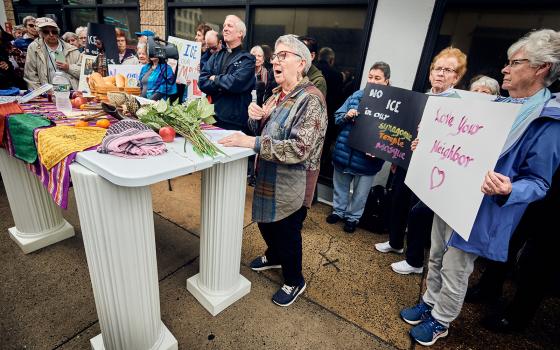Several Catholic universities are engaged in labor disputes, trying to deny their adjunct professors, or other employees, the right to organize a union. These university efforts to resist their workers’ rights come in different forms, but they are all to be deplored.
Loyola University of Chicago is currently arguing that the National Labor Relations Board has no jurisdiction over its employees because it is a religious institution and, therefore, its religious freedom would be diminished if the NRLB was able to rule in favor of the organizing effort, which is being led by the Service Employees International Union (SEIU). The university states:
At the hearing, the University argued that we, as a Jesuit, Catholic university, have the right to define our own mission and govern our institution in accordance with our values and beliefs, free from government entanglement. By raising the jurisdictional issue, we are simply seeking to maintain our right to religious freedom, and our position on this issue is not different from the Association of Jesuit Colleges and Universities and the Association of Catholic Colleges and Universities, both of which have filed support positions in NLRB cases similar to ours.
I am not allergic to the idea that religious institutions should be largely free of government interference. Civil society can and should develop greater vibrancy in the absence of government interventions, and religious institutions especially should be able to march to the tune of a different divine drummer if they so choose. But, this right is not absolute. Loyola must accommodate itself to Chicago’s zoning requirements, its buildings cannot contain asbestos or lead paint, it can’t employ slave labor, and if you look at what adjuncts get paid, that last analogy is not that far of a stretch.
But, how can Loyola invoke its religious character to defend against a union organizing effort when denying the right to organize runs completely contrary to that religious character? I see that the school offers a minor in “Catholic Studies,” and that they pledge to help students “[l]earn about the developing nature of Catholic beliefs and practices through history, especially Catholicism’s relationship with modern Western culture and political institutions.” Surely, part of that history would include the role of America’s greatest churchman, Cardinal James Gibbons, in prompting Pope Leo XIII to write the encyclical Rerum Novarum. Gibbons had successfully fought to prevent the Holy Office from condemning the Knights of Labor in the late 1880s and, as well, against a condemnation of the writings of Henry George. Instead of condemnations, Gibbons urged the pope to set forth what the Church teaches about what was then called “the social question,” issues of labor versus property rights, the role of government in overseeing economic relations, etc. And, in Rerum Novarum, Leo affirmed the rights of workers to organize in the clearest of terms. Subsequent popes have reaffirmed the right to organize in equally clear terms. The U.S. bishops have stated, “No one may deny the right to organize without attacking human dignity itself.”
The Catholic Church does believe that certainly ministerial positions should not be subject to secular labor laws, a fact long recognized by the courts and reaffirmed as recently as the unanimous 2012 decision in Hosanna-Tabor v. EEOC. As Chicago’s Archbishop Blase Cupich noted in a speech widely and correctly seen as a strong defense of labor in September:
Because the Archdiocese is an employer, some employees and some unions may want to organize in our workplaces. Some Archdiocesan employees are already organized and we work with their union to advance our mission and our mutual obligations to workers. Others are not. And that is because some “jobs” in the Church are really ministerial positions, and must answer to a higher law than those passed by legislatures, we may have differences in this area. But if we stay firm in our commitment to principled dialogue, we can resolve differences and move forward together.
Surely, Loyola does not think that all of its adjunct professors are ministers, does it? We are Catholics, and we do not have any freelance ministers. If they are ministers, to whom are they responsible for their ministerial conduct? The Jesuit superior? The archbishop? If all professors are ministers, answerable to a higher authority in a hierarchic Church, I wonder what the accreditation boards think such a connection implies for the academic freedom of the university? At a small parish school, I could make the case that it is often the janitor, who has been there for thirty years and remembers the students’ parents as pupils, who exercises the truest ministry in the school. At a university, while certainly all faculty and staff are in some sense responsible to the institution’s mission and goals, unless they are in senior leadership or in a theological teaching post that requires a mandatum, they are not really ministers and, so, if they want to join SEIU, they should be permitted to do so.
The university states on its website:
Our preference is to maintain a direct working relationship with our faculty—without interference from a third party that may not understand our University, our mission, or our values—in the belief that it gives our University, our faculty, and our students the best opportunity to build on the improvements that we have made and will continue to make. It is difficult to imagine how a third party will be able to assist our deans, chairpersons, and faculty deliver the transformative education we promise our students.
I am sure many employers have a similar preference; They all tend to think they do right by their employees. But this paragraph was written by someone who doesn’t know much about Catholic Social Teaching and doesn’t know much about unions. It is not a matter of the employers’ preference, but of the employees, and a union is not a “third party” distinct from the employees, it is the employees standing together. Perhaps, having studied the role of Cardinal Gibbons in urging what became Rerum Novarum, the students in Loyola’s Catholic Studies program can look at the efforts by Cardinal William O’Connell and his allies in Rome to get the Vatican to suppress the National Catholic Welfare Conference (NCWC), forerunner of today’s United States Conference of Catholic Bishops. Bishop Joseph Schrembs went to Rome to defend the NCWC and told O’Connell’s ally, Cardinal De Lai, that “Rome’s mentality was that it is easier to deal with bishops individually than with an entire hierarchy,” according to historian Gerald Fogarty, S.J. What is good for the bishops’ goose is good for the adjunct professors’ gander.
Archbishop Cupich has no jurisdiction over the employee policies at Loyola, but I would commend his September talk to those university administrators, at Loyola and elsewhere, who wish to frustrate the desires of their employees to form a union. Like Pope Francis, he calls for dialogue when there are differences, and like Pope Francis, he is crystal clear about the Church’s teaching on the rights of workers. Instead of listening to their lawyers and hiding shamefully behind the First Amendment, Loyola should do the right thing and allow its workers to exercise their fundamental rights.




